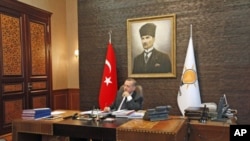Turkish Prime Minister Recep Tayyip Erdogan's ruling Justice and Development Party will have an unprecedented third term after winning a decisive victory in Sunday's parliamentary elections.
However, the ruling party failed to win the two-thirds majority needed to carry out constitutional reforms, forcing Erdogan to seek support from other political parties. He has vowed to reach out to the opposition, saying the vote result shows the new constitution will be achieved by compromise.
The prime minister has promised to amend the constitution, written in 1982 when Turkey was under military rule.
In the 550-seat parliament, the ruling party won 49.9 percent of the vote, or 326 seats. That's the most since it came to power 10 years ago, but short of the 330 needed to call a referendum. The main opposition Republican People's Party garnered 25.9 percent of the vote, or 135 seats, and the Nationalist Action Party won 13 percent of the vote, or 53 seats.
The pro-Kurdish Peace and Democracy Party also did well in Sunday's vote, increasing the party's seats from 20 to 36. Analysts say the pro-Kurdish party's strong showing played a role in denying the ruling party a bigger win.
It is not clear what changes the prime minister plans to make. Turkey and Erdogan's government often are cited as a model for supporters of democracy in the Middle East and North Africa. But political opponents have said they believe Erdogan is becoming more autocratic, less tolerant of the opposition, and is moving Turkey away from a secular state to a more Islamic-style government.
His backers say the amended constitution would guarantee more rights for minorities, including Kurds. Observers say Kurdish support could be crucial in drafting the new constitution, which Kurdish leaders say should recognize the Kurds as a distinct element of the nation, and should grant them autonomy.
The Kurds had threatened to boycott Sunday's vote after Turkey's main election board announced plans to ban seven Kurdish candidates from running. That decision was later reversed. The outlawed Kurdistan Workers' Party, or PKK, has been fighting for an ethnic homeland since 1984. That fighting has killed about 40,000 people. Turkey, the United States and the European Union consider the PKK a terrorist group.
Although Sunday's vote was peaceful, the Anatolia news agency reported police arrested 34 people in the mainly Kurdish southeastern province of Batman for allegedly trying to coerce people into supporting Kurdish nationalists running as independents.
Some information for this report was provided by AP, AFP and Reuters.




